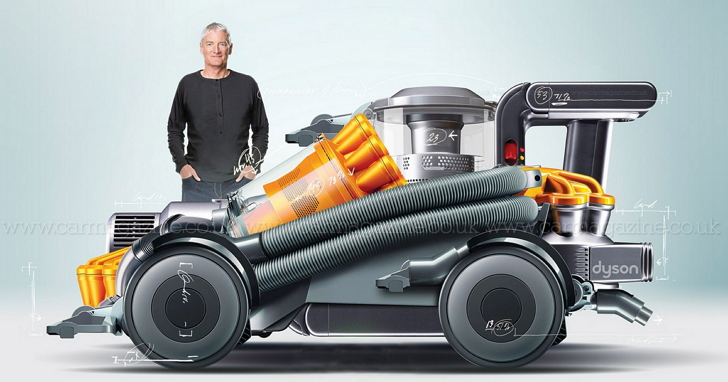
英國皇家工程院院士和皇家學會會士詹姆斯·戴森爵士,昨天透過郵件向公司全體員工宣佈:因為今天是個神奇的日子,大家都喜愛的戴森 (Dyson),宣佈進軍電動汽車行業了……。新車預計 2020 年問世。
戴森爵士利用流體力學原理髮明了旋風分離式 (cyclonic seperation) 吸塵器,但沒有公司願意買他的設計(因為會影響吸塵器塵袋的銷售),所以他創立了戴森公司自己生產吸塵器,從日本起步做郵政販賣,拿了設計獎,花了十幾年的時間才在英國本土以及全球暢銷開來。目前,戴森生產的高階吸塵器備受消費者的青睞。

但在那些家裡可以亂、髮型不能亂的年輕人心目中,戴森公司迄今為止最優秀的產品應該是2016 年的 「Supersonic」吹風機。大約從五年前開始研發,戴森利用之前的無扇葉風扇技術,設計了一款風量超大但又尺寸極小且超靜音的馬達,花了足足四年設計出了這款超靜音吹風機,售價 將近台幣一萬五千元……

除了吹風機、吸塵器之外,戴森公司其他的好評產品還有無扇葉風扇/空調/加濕器。哦對了,就在今年 6 月,戴森還推出了一款號稱 37 年不用換燈泡的 CSYS 檯燈,售價仍然是「戴森」級。這款檯燈所用熱管技術的發明者是戴森爵士的兒子傑克·戴森 (Jake Dyson)。
戴森產品都挺貴,就連收入不錯的白領工作者想買都得好好思索一下,畢竟買了之後半個月薪水就沒了……但很多人還是成為了戴森的擁躉——作為時尚風潮的代表產品,成為戴森的用戶能讓你的生活品質提高一大截……還是值得的。
戴森還有一些其他商用產品,比如 Airblade乾手器、商用照明等等。整體來說,這還是一家非常不錯的消費電子企業……可它怎麼突然跑去做電動汽車了呢?
其實戴森跟汽車的故事要追溯到1980、90年代。1988 年,戴森爵士看到一篇論文,發現柴油機的尾氣有嚴重的健康危害。戴森在 1990 年設立了一個專門的團隊,用旋風分離技術做柴油機尾氣顆粒捕獲。

到 1993 年,這個團隊已經開發出了可用的原型,他們為了推廣還把這款產品送上過電視節目。遺憾的是,和那些看走眼的吸塵器廠商一樣,汽車公司也對戴森的顆粒捕獲技術不感興趣。理由你肯定想不到:他們覺得捕獲這些有害物質之後處理起來太麻煩、太昂貴……
戴森爵士做這件事是想要促進技術進步和保護行人健康,但在當時環保並不是那麼大的一個議題。考慮到戴森還有核心業務——吸塵器要做,這個柴油機尾氣顆粒捕獲的計畫就沒有做下去。
但戴森爵士是個記性很好的人,清潔汽車技術這件事,他一直放在心裡。到了 2016 年,Supersonic 吹風機發佈後在市場上廣受好評,戴森爵士突然想起了汽車。
他發現:戴森既有強大的電動馬達,電池技術能力也不差,還有非常豐富的流體力學研究經驗和產品轉化能力。但問題是,過去這些技術都是相對獨立的,存在於不同的產品裡,比如吹風機、無扇葉風扇和吸塵器裡——有沒有一個產品,能夠把戴森的所有技術和研發實力都集合到一起?
這個產品就是汽車,電動汽車。

去年 9 月和今年 8 月,戴森先後從奧斯頓馬丁招來了兩名高層,分別為產品研發總監伊恩·邁納德 (Ian Minards) 和採購總監大衛·威爾 (David Wyer)。另據 Recode 報導,前特斯拉全球公關副總裁目前在戴森負責公關。戴森的電動汽車團隊成員已經超過 400 人,並將繼續高速擴張。戴森爵士還保證將投資 20 億英鎊用於電動汽車研發。
所以,「戴森」牌電動汽車長什麼樣,跑多快,有什麼特性?這些戴森爵士都拒絕透露,原因是「汽車業技術競爭太過於激烈」,關於汽車的細節該公司都必須儘量保密。
不會長這樣吧:

開個玩笑……
不過有一點可以確定的,那就是:
.
.
.
.
.
.
這可能是第一款你賣腎都買不起的戴森產品……
內部信全文:
In 1988 I read a paper by the US National Institute for Occupational Safety and Health, linking the exhaust from diesel engines to premature death in laboratory mice and rats. In March 1990 a team at Dyson began work on a cyclonic filter that could be fitted on a vehicle's exhaust system to trap particulates.
By 1993 we had developed several working prototypes and showed an early iteration to British television programme Blue Peter. The team went on to develop a much more sophisticated technology.
To our chagrin, nobody at the time was interested in employing our diesel exhaust capture system and we stopped the project. The industry said that 『disposing' of the collected soot was too much of a problem! Better to breathe it in?
In the period since, governments around the world have encouraged the adoption of oxymoronically designated 『clean diesel' engines through subsidies and grants. Major auto manufacturers have circumvented and duped clean air regulations. As a result, developed and developing cities are full of smog-belching cars, lorries and buses. It is a problem that others are ignoring.
Throughout, it has remained my ambition to find a solution to the global problem of air pollution. Some years ago, observing that automotive firms were not changing their spots, I committed the company to develop new battery technologies. I believed that electrically powered vehicles would solve the vehicle pollution problem. Dyson carried on innovating. The latest digital motors and energy storage systems power the Dyson Supersonic hair dryer and cord-free vacuum line. We've relentlessly innovated in fluid dynamics and HVAC systems to build our fans, heaters and purifiers.
At this moment, we finally have the opportunity to bring all our technologies together into a single product. Rather than filtering emissions at the exhaust pipe, today we have the ability to solve it at the source. So I wanted you to hear it directly from me: Dyson has begun work on a battery electric vehicle, due to be launched by 2020.
We've started building an exceptional team that combines top Dyson engineers with talented individuals from the automotive industry. The team is already over 400 strong, and we are recruiting aggressively. I'm committed to investing £2bn on this endeavour.
The project will grow quickly from here but at this stage we will not release any information. Competition for new technology in the automotive industry is fierce and we must do everything we can to keep the specifics of our vehicle confidential
In London, nearly 9,500 people die early each year due to long-term exposure to air pollution according to a study carried out by researchers at King's College London. The World Health Organisation reports 「in 2012 around 7 million people died – one in eight of total global deaths – as a result of air pollution exposure」. It is our obligation to offer a solution to the world's largest single environmental risk. I look forward to showing you all what I hope will be something quite unique and better, in due course!
James
- 本文授權轉載自pingwest

請注意!留言要自負法律責任,相關案例層出不窮,請慎重發文!